List of crossings of the River Severn

This is a list of crossings of the River Severn in Great Britain (including bridges, tunnels, ferries and fords), in order from source to mouth.
The Severn has historically been a very important and busy river, and has been bridged throughout history. The bridges that stand today are often of great historical and/or engineering interest — for example the world's first iron bridge, The Iron Bridge, built from cast iron crosses the River Severn at Ironbridge Gorge. The Iron Bridge is one of three bridges on the River Severn that are listed as grade I structures, including Bewdley Bridge and the Severn Bridge, which was opened in 1966. In total, 31 bridges that cross the River Severn are listed, either grade I, II* or II. Four bridges are Scheduled Monuments, including The Iron Bridge, which are nationally important archaeological bridges.
Many reaches of the Severn are prone to severe flooding, prompting the design of many unique bridges to cope with this.
Crossings
| Status | Criteria[1] |
|---|---|
| I | Grade I listed. Bridge of exceptional interest, sometimes considered to be internationally important |
| II* | Grade II* listed. Particularly important bridge of more than special interest |
| II | Grade II listed. Bridge of national importance and special interest |
| Scheduled Monument. Nationally important archaeological bridge. |
In order, moving downstream:
| Crossing | Date | Coordinates | Heritage status |
Locality | Notes | Image |
|---|---|---|---|---|---|---|
| The source of the River Severn | 52°29′36″N 3°44′04″W / 52.49347°N 3.73458°W | - | Included for completeness |  | ||
| First culvert on the Severn | 52°29′19″N 3°43′36″W / 52.48855°N 3.72676°W | - | Hafren Forest | Provides Forestry Access.
Also carries the Severn Way long distance footpath from left bank to right bank when heading downstream. |
 | |
| First footbridge on the Severn | 52°29′13″N 3°43′20″W / 52.48681°N 3.72227°W | - | Hafren Forest | Carries the Severn Way long distance footpath from right bank to left bank when heading downstream. |  | |
| Blaen Hafren Falls culvert | 52°28′53″N 3°42′58″W / 52.48151°N 3.71618°W | - | Hafren Forest | Provides forestry access.
Also carries Severn Way long distance footpath from left bank to right bank when heading downstream. |
 | |
| Second footbridge on the Severn | 1992 | 52°28′22″N 3°42′05″W / 52.47276°N 3.70141°W | - | Hafren Forest | Previously known as the 'First Bridge On The Severn'. Opened May 1992 by Lady Hooson, wife of Emlyn Hooson, Baron Hooson. Also carries Severn Way long distance footpath from right bank to left bank when heading downstream. The Wye Valley Walk long distance footpath starts here. |  |
| Rhyd-y-Benwch Ford | 52°28′06″N 3°41′05″W / 52.46847°N 3.68475°W | - | Hafren Forest | First ford on the Severn. Provides forestry access. |  | |
| Rhyd-y-Benwch Footbridge | 1997 | 52°28′02″N 3°40′54″W / 52.46716°N 3.68180°W | - | Hafren Forest |  | |
| Cwm Ricket Bridge | 52°27′59″N 3°40′42″W / 52.46636°N 3.67824°W | - | <span lang-"cy">Cwm Ricket | First road bridge on the river. Weight limit of 12.5T. |  | |
| Cwm Ricket Pipe Bridge | 52°27′59″N 3°40′40″W / 52.46632°N 3.67775°W | - | <span lang-"cy">Cwm Ricket | Previously known as Irish Bridge and Paddy's Bridge. Provides forestry access, as nearby Cwm Ricket Bridge has a 12.5T weight limit. With high water, it becomes a ford. |  | |
| Severn Break Its Neck Footbridge | 1995 | 52°28′00″N 3°40′30″W / 52.46665°N 3.67500°W | - | <span lang-"cy">Rhyd-yr-Onnen | Provides view of waterfall and gorge. |  |
| Rhyd-yr-Onnen Footbridge | 52°27′55″N 3°39′51″W / 52.46541°N 3.66407°W | - | <span lang-"cy">Rhyd-yr-Onnen |  | ||
| Hafodfeddgar Farm Bridge | 52°27′32″N 3°39′25″W / 52.45902°N 3.65694°W | - | <span lang-"cy">Hafodfeddgar | Provides farm access. |  | |
| Geufron Farm Bridge | 52°27′23″N 3°38′50″W / 52.45634°N 3.64720°W | - | <span lang-"cy">Geufron | Provides farm access. |  | |
| Tynwtra Footbridge | 52°27′14″N 3°38′11″W / 52.45396°N 3.63637°W | - | <span lang-"cy">Tan Hinon | Has been dismantled - only abuttments remain. |  | |
| Glynhafren Farm Bridge | 52°26′55″N 3°37′41″W / 52.44850°N 3.62806°W | - | <span lang-"cy">Glynhafren | Provides farm access. |  | |
| Old Hall Ford | 52°26′53″N 3°36′52″W / 52.44819°N 3.61448°W | - | Old Hall | Provides farm access. |  | |
| Glanhafren Bridge | 1972 | 52°26′53″N 3°36′27″W / 52.44804°N 3.60761°W | - | Old Hall | First tarmac-surfaced road bridge on the Severn. |  |
| Nantyrhebog Footbridge | 52°27′02″N 3°34′47″W / 52.45068°N 3.57978°W | - | <span lang-"cy">Glan-y-Nant |  | ||
| Cancoed Footbridge | 52°26′35″N 3°33′19″W / 52.44294°N 3.55540°W | - | <span lang-"cy">Glan-y-Nant |  | ||
| Felindre Bridge | 1848 | 52°26′35″N 3°33′19″W / 52.44294°N 3.55540°W | II | Mount Severn | Designed by Thomas Penson, masonry arch bridge |  |
| Colonel's Bridge | 1975 | 52°26′41″N 3°32′54″W / 52.44465°N 3.54839°W | - | Llanidloes | Timber bridge also known as Pen-y-Green Bridge, named after Colonel Davies-Jenkins |  |
| Short Bridge | 1850 | 52°26′57″N 3°32′33″W / 52.44911°N 3.54242°W | II | <span lang-"cy">Llanidloes | Designed by Thomas Penson |  |
| Long Bridge | 1826 | 52°27′04″N 3°32′21″W / 52.45104°N 3.53923°W | II | <span lang-"cy">Llanidloes | Designed by Thomas Penson, carried the B4518 road. |  |
| Morfodion Farm Bridge | 1859 | 52°27′26″N 3°30′32″W / 52.45735°N 3.50879°W | - | <span lang-"cy">Llanidloes | Timber bridge built as part of the Llanidloes and Newtown Railway, later becoming part of the Cambrian Railway's route from Newtown to Builth Wells; the railway was closed on 31 December 1962. Now used as a farm access bridge. |  |
| Dolwen Bridge | 1926 | 52°27′19″N 3°28′39″W / 52.45541°N 3.47737°W | - | Upper Penrhuddlan |  | |
| Llandinam Bridge | 1843 | 52°29′11″N 3°26′13″W / 52.48645°N 3.43698°W | II* | <span lang-"cy">Llandinam | Iron arch bridge designed by Thomas Penson, the first of its type in Montgomeryshire. |  |
| Caersws Railway Bridge | 52°30′50″N 3°25′43″W / 52.51392°N 3.42867°W | - | Caersws | Timber bridge carries the Cambrian Line. |  | |
| Caersws Bridge | 1821 | 52°30′52″N 3°25′38″W / 52.51439°N 3.42713°W | II | <span lang-"cy">Caersws | Triple span arch bridge designed by Thomas Penson. Carries the A470 road. |  |
| Festival Footbridge | 1951 | 52°31′17″N 3°23′21″W / 52.52130°N 3.38919°W | - | <span lang-"cy">Aberhafesp | Suspension footbridge built by David Rowell & Co. |  |
| Penstrowed Railway Bridge | 52°30′33″N 3°21′55″W / 52.50905°N 3.36515°W | - | <span lang-"cy">Penstrowed | Carries the Cambrian Line. |  | |
| Glanhafren Hall Railway Bridge | 52°30′21″N 3°21′08″W / 52.50594°N 3.35230°W | - | Glanhafren Hall | Carries the Cambrian Line. |  | |
| Dolerw Park Footbridge | 1973 | 52°30′54″N 3°19′12″W / 52.51497°N 3.31998°W | - | Newtown, Powys | Suspension footbridge designed by Mott, Hay and Anderson |  |
| The Long Bridge | 1827 | 52°31′01″N 3°19′00″W / 52.51707°N 3.31675°W | II | Newtown | Designed by Thomas Penson |  |
| Halfpenny Footbridge | 1972 | 52°30′56″N 3°18′48″W / 52.51548°N 3.31325°W | - | Newtown | Fourth bridge on this site, the first dating from 1830 |  |
| Newtown Bypass Bridge | 1993 | 52°30′53″N 3°18′34″W / 52.51482°N 3.30933°W | - | Newtown | Carries the B4568 road, Cambrian Way. |  |
| Cilgwrgan Bridge | 1862 | 52°34′30″N 3°11′13″W / 52.57505°N 3.18681°W | II | <span lang-"cy">Aberbechan | 3-span brickwork arch bridge |  |
| Abermule Bypass Bridge | 1975 | 52°32′28″N 3°14′39″W / 52.54098°N 3.24416°W | - | <span lang-"cy">Abermule |  | |
| Brynderwen Bridge | 1852 | 52°32′52″N 3°14′12″W / 52.54774°N 3.23657°W | II* | <span lang-"cy">Abermule | Designed by Thomas Penson, built by the Brymbo Company of Wrexham. Bridge is inscribed: THIS SECOND IRON BRIDGE CONSTRUCTED IN THE COUNTY OF MONTGOMERY WAS ERECTED IN THE YEAR 1852. |  |
| Fron Footbridge | 1926 | 52°34′05″N 3°12′26″W / 52.56815°N 3.20727°W | - | <span lang-"cy">Plas Meredydd | Suspension footbridge by David Rowell & Co | 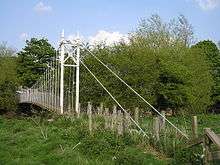 |
| Caerhowel Bridge | 1858 | 52°34′30″N 3°11′13″W / 52.57509°N 3.18681°W | II | Trwstllewelyn | Designed by Thomas Penson. Bridge is narrow, with traffic lights. | 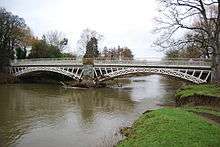 |
| Cil-cewydd Bridge | 1861 | 52°37′45″N 3°08′32″W / 52.62906°N 3.14230°W | II | <span lang-"cy">Cil-cewydd | Designed by Thomas Penson. |  |
| Cil-cewydd Railway Bridge | 52°37′47″N 3°08′30″W / 52.62964°N 3.14179°W | - | <span lang-"cy">Cil-cewydd | Built for Oswestry and Newtown Railway |  | |
| Leighton Bridge | 1872 | 52°39′18″N 3°07′46″W / 52.65505°N 3.12958°W | II | Welshpool | Carries the B4381 road. The listing description is "Bridge over channel N of Severn Lodge". |  |
| Buttington Railway Bridge | 52°40′19″N 3°06′57″W / 52.67185°N 3.11573°W | - | Welshpool |  | ||
| Buttington Bridge | 1872 | 52°40′21″N 3°06′58″W / 52.67253°N 3.11616°W | II | Welshpool | Cast iron arch bridge, carries the A458 road. |  |
| Pool Quay Farm Bridge | 52°41′40″N 3°06′08″W / 52.69449°N 3.10209°W | - | Pool Quay |  | ||
| Llandrinio Bridge | 1775 | 52°44′45″N 3°02′27″W / 52.74595°N 3.04085°W | II | Llandrinio | Stone arch bridge. Oldest surviving bridge on the river. Bridge is narrow with traffic lights. |  |
| Crewgreen Bridge | 1947 | 52°44′08″N 2°59′38″W / 52.73546°N 2.99390°W | - | Crewgreen | Built as a railway bridge but converted to a road bridge. Crosses from Wales to England. |  |
| Montford Bypass Bridge | 1992 | 52°43′51″N 2°50′45″W / 52.73096°N 2.84589°W | - | Montford | Carries the A5 road. Designed by Sir Owen Williams and Partners as part of the A5 Telford to Shrewsbury and A49 link improvement. |  |
| Montford Bridge | 1792 | 52°43′56″N 2°50′33″W / 52.73221°N 2.84262°W | II | Montford Bridge | Masonry arch bridge by Thomas Telford. Former A5 route, now carried the B4380 road. |  |
| Frankwell Footbridge | 1979 | 52°42′38″N 2°45′18″W / 52.71064°N 2.75501°W | - | Frankwell, Shrewsbury | Cable-stayed footbridge designed by Mott, Hay and Anderson |  |
| St George's Bridge | 52°42′37″N 2°45′24″W / 52.71028°N 2.75667°W | - | Shrewsbury | Demolished in 1795 and replaced by the Welsh Bridge. It was also known as the Old Welsh Bridge. | 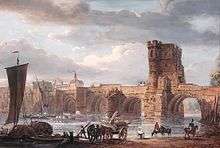 | |
| Welsh Bridge | 1795 | 52°42′36″N 2°45′29″W / 52.71013°N 2.75807°W | II* | Frankwell, Shrewsbury |  | |
| Porthill Bridge | 1922 | 52°42′30″N 2°45′49″W / 52.70842°N 2.76371°W | - | Shrewsbury | Suspension footbridge by David Rowell & Co |  |
| Kingsland Bridge | 1881 | 52°42′16″N 2°45′32″W / 52.70437°N 2.75895°W | II | Shrewsbury | Toll road bridge |  |
| Greyfriars Footbridge | 1879 | 52°42′17″N 2°44′56″W / 52.70467°N 2.74893°W | - | Coleham, Shrewsbury | Wrought iron truss bridge |  |
| English Bridge | 1927 | 52°42′24″N 2°44′51″W / 52.70660°N 2.74748°W | II* | Shrewsbury | Designed by John Gwynn. Completely rebuilt in the 1920s using the original 1774 stone work, but the bridge was widened by 26 feet (7.9 m) and the gradient reduced; reopened on 26 October 1927. It carries the A458 road. | 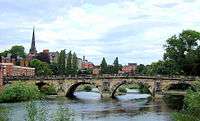 |
| Shrewsbury Railway Station Bridge | 1838 | 52°42′38″N 2°44′52″W / 52.71069°N 2.74782°W | - | Shrewsbury station | Designed by Robert Stephenson and Joseph Locke. |  |
| Castle Walk Footbridge | 1951 | 52°42′45″N 2°44′38″W / 52.71250°N 2.74382°W | - | Shrewsbury | The first prestressed concrete balanced cantilever bridge in the UK |  |
| Telford Way Bridge | 1964 | 52°43′21″N 2°43′57″W / 52.72242°N 2.73255°W | - | Shrewsbury | Prestressed concrete bridge. Designed by Scott Wilson Group, it carries the A5112 road. |  |
| Shrewsbury Bypass Bridge | 1992 | 52°43′20″N 2°42′24″W / 52.72236°N 2.70667°W | - | Shrewsbury | Carries the A49 road. |  |
| Shrewsbury Bypass Bridge | 1992 | 52°43′01″N 2°42′17″W / 52.71701°N 2.70478°W | - | Shrewsbury | Carries the A49 road. |  |
| Belvidere Bridge | 1848 | 52°42′30″N 2°42′46″W / 52.70825°N 2.71271°W | II* | Shrewsbury | Designed by William Baker; carries the Wolverhampton to Shrewsbury Line. |  |
| Shrewsbury Bypass Bridge | 1992 | 52°41′39″N 2°42′34″W / 52.69417°N 2.70942°W | - | Shrewsbury | Carries the A5/A49. |  |
| Atcham New Bridge | 1929 | 52°40′47″N 2°40′53″W / 52.6798°N 2.6813°W | - | Atcham | Designed by L G Mouchel |  |
| Atcham Bridge | 1776 | 52°40′46″N 2°40′52″W / 52.67948°N 2.68124°W | II* | Atcham | Masonry arch viaduct designed by John Gwynn |  |
| Cressage Bridge | 1913 | 52°38′13″N 2°36′00″W / 52.63702°N 2.60004°W | - | Cressage | Carries the B4380 road. Reinforced concrete bridge by L G Mouchel |  |
| Buildwas Bridge | 1992 | 52°38′11″N 2°31′32″W / 52.63642°N 2.52567°W | - | Buildwas | Carries the A4169 road. Replaced a bridge previously built in 1796 by Thomas Telford |  |
| Ironbridge "A" Road Bridge (disused) | 1932 | 52°38′11″N 2°30′47″W / 52.63637°N 2.51293°W | - | Ironbridge | Coalbrookdale. Steel truss bridge providing access to Ironbridge Power Station |  |
| Ironbridge "B" Road Bridge | 1963 | 52°37′59″N 2°30′25″W / 52.63298°N 2.50683°W | - | Ironbridge | Coalbrookdale. Prestressed concrete bridge providing access to Ironbridge Power Station |  |
| Albert Edward Bridge | 1864 | 52°37′50″N 2°30′12″W / 52.63061°N 2.50333°W | II | Designed by John Fowler; carries the remaining section of the Wellington to Craven Arms Railway | ||
| The Iron Bridge | 1779 | 52°37′35″N 2°28′23″W / 52.62637°N 2.47292°W | I | Ironbridge | Arch bridge; the world's first cast iron bridge, built by Abraham Darby III, now foot access only. In the 1970s, major work was undertaken to restore the bridge, including an inverted concrete arch in the river bed to keep the abutments apart. |  |
| Free Bridge, Jackfield | 1909 | 52°37′35″N 2°28′21″W / 52.62649°N 2.47259°W | II | Jackfield | The Free Bridge, which was also known as the Haynes Memorial Bridge, opened in 1909 by public subscription, it was the first toll-free crossing of the Ironbridge Gorge. The bridge was the first bridge in England constructed using reinforced concrete and was designed by L G Mouchel. The bridge became unsafe and was demolished in 1993 to make way for the new Jackfield Bridge. |  |
| Jackfield Bridge | 1994 | 52°37′35″N 2°28′21″W / 52.62649°N 2.47259°W | - | Jackfield | Cable-stayed bridge designed by Gifford & Partners, carrying the B4373 road. |  |
| Jackfield and Coalport Memorial Footbridge | 1922 | 52°37′11″N 2°27′13″W / 52.61985°N 2.45369°W | - | Coalport | A steel truss footbridge |  |
| Coalport Bridge | 1818 | 52°36′55″N 2°26′31″W / 52.61537°N 2.44208°W | II* | Coalport | Iron arch bridge, replaced a crossing built in 1777 |  |
| Coalport Sewage Treatment Works Bridge | 52°36′40″N 2°25′56″W / 52.61115°N 2.43211°W | - | Coalport | Bridge serving the Coalport Sewage Treatment Works, owned by Severn Trent Water |  | |
| Apley Park Bridge | 1905 | 52°34′55″N 2°26′04″W / 52.5819°N 2.4345°W | - | Suspension footbridge, designed and built by David Rowell & Co. This is a private road bridge for the Apley Park Estate, and is not a public footpath. Weight limit is 1 tonne, and only one vehicle allowed on the bridge at a time. |  | |
| Severn Bridge, Bridgnorth | 1823 | 52°32′03″N 2°24′58″W / 52.53413°N 2.41613°W | II | Bridgnorth | Originally medieval, but rebuilt in 1795 with improvements made Thomas Telford in 1823 |  |
| Bridgnorth Bypass Bridge | 1985 | 52°31′39″N 2°25′02″W / 52.52739°N 2.41721°W | - | Bridgnorth | A458 |  |
| Hampton Loade Water Treatment Works bridge | 1965 | 52°28′51″N 2°22′31″W / 52.48092°N 2.37533°W | - | Hampton Loade | Bridge serving the Hampton Loade Water Treatment Works. The tubular welded blue arches are waterpipes that carry a small roadway suspended below. The bridge is owned by South Staffordshire Water. |  |
| Hampton Loade Ferry | <1600 | 52°28′34″N 2°22′26″W / 52.47606°N 2.37391°W | - | Hampton Loade | The only 'Reaction Cable' ferry in the UK. The present boat dates from 2004. It is 20 feet (6.1 m) by 9 feet (2.7 m) and carries up to 12 passengers plus the operator. Operated by the Hampton Loade Community Trust at weekends during the summer provided the river level is suitable. |  |
| Highley-Alveley Footbridge | 2006 | 52°27′10″N 2°22′17″W / 52.45265°N 2.37136°W | - | Highley | Replaced the Alveley Colliery Bridge, which was built in 1937 to take coal to Stourport Power Station. |  |
| Upper Arley Ferry | 1331–1972 | 52°25′09″N 2°20′51″W / 52.41920°N 2.34740°W | - | Upper Arley | Ancient ferry, replaced by the Arley footbridge |  |
| Arley footbridge | 1971 | 52°25′06″N 2°20′45″W / 52.41820°N 2.34578°W | - | Upper Arley | Truss footbridge, replaced a vehicular ferry |  |
| Victoria Bridge | 1861 | 52°24′38″N 2°20′41″W / 52.41048°N 2.34476°W | II* | Upper Arley. | Cast iron arch designed by John Fowler. Carries the Severn Valley Railway. |  |
| Elan aqueduct | circa 1900 | 52°24′04″N 2°19′53″W / 52.40117°N 2.33145°W | - | Trimpley | Carries water from the Elan Valley at Rhayader to Birmingham. It is also known as the Elan Valley Pipeline Bridge |  |
| Dowles Bridge | 1864 | 52°23′07″N 2°19′30″W / 52.38531°N 2.32495°W | - | On the former Tenbury & Bewdley Railway; dismantled 1965, piers only remaining. |  | |
| Bewdley Bridge | 1798 | 52°22′35″N 2°18′50″W / 52.37646°N 2.31390°W | I | Bewdley | Multiple masonry arches, designed by Thomas Telford. Listed as "Severn Bridge Including Flanking Arches and Balustrade". |  |
| Bewdley Bypass Bridge | 1987 | 52°21′59″N 2°18′15″W / 52.36629°N 2.30411°W | - | Bewdley | Carries the A456 road |  |
| Stourport Bridge | 1870 | 52°20′14″N 2°16′59″W / 52.33713°N 2.28318°W | II | Stourport-on-Severn | Single iron arch, replaced a 1775 bridge. Listed as "Bridge over River Severn" | .jpg) |
| Holt Fleet Bridge | 1828 | 52°16′05″N 2°15′32″W / 52.26818°N 2.25889°W | II | Holt Fleet | Cast iron trussed arch; designed by Telford, opened 1828 and strengthened with reinforced concrete in 1928. Identical design to Galton Bridge, Smethwick over canal (1829). |  |
| Bevere Island Bridge | 1844 | 52°13′58″N 2°14′21″W / 52.23282°N 2.23913°W | - | Grimley | Links island to East bank; not a full crossing. |  |
| Sabrina Footbridge | 1992 | 52°11′40″N 2°13′55″W / 52.19445°N 2.23205°W | - | Worcester | Asymmetrical, cable-stayed bridge with one tower. |  |
| Worcester Railway Bridge | 1904 | 52°11′35″N 2°13′47″W / 52.19310°N 2.22974°W | II | Worcester | Iron truss. Listed as "Railway Bridge, Worcester". Carries the Cotswold Line over the river near Worcester Foregate Street station. |  |
| Worcester Bridge | 1781 | 52°11′27″N 2°13′35″W / 52.19083°N 2.22632°W | II | Worcester | Multiple masonry arches designed by John Gwynn. Reconstructed in 1930. Carried the A44 |  |
| Worcester Cathedral Ferry | Ancient | 52°11′16″N 2°13′22″W / 52.18785°N 2.22279°W | - | Worcester | Also known as Priory Ferry. Operated every day till the 1950s. Service restarted in 1983. As of 2009, it is the only Rowing Ferry across the River Severn; it is operated by volunteers during the summer, every afternoon at weekends and bank holidays. |  |
| Diglis Bridge | June 2010 | 52°10′34″N 2°13′29″W / 52.17624°N 2.22474°W | - | Worcester | Located just downstream of Diglis Island. Carrying pedestrians and Route 46 of the National Cycle Network[2][3] |  |
| Carrington Bridge | 1985 | 52°09′46″N 2°13′04″W / 52.16290°N 2.21774°W | - | Worcester | Carrying the A4440 Southern Link Road[4] |  |
| Rhydd Ferry | 52°06′27″N 2°14′32″W / 52.10758°N 2.24233°W | - | Worcester | Ferry was working until approximately 1914.[5] |  | |
| Upton-upon-Severn bridge | 1940 | 52°03′56″N 2°13′04″W / 52.06560°N 2.21767°W | - | Upton-upon-Severn | Girder bridge, latest of several here dating back to 1539. |  |
| Upton-upon-Severn Railway Bridge | - | Upton-upon-Severn | Former bridge of the Tewkesbury and Malvern Railway which was part of the Midland Railway. The currently closed line ran from Great Malvern to Tewkesbury. Demolished bridge over the River. | |||
| Queenhill Viaduct | 1960 | 52°01′49″N 2°11′43″W / 52.03026°N 2.19541°W | - | Queenhill | Carrying the M50 Motorway |  |
| Mythe Bridge | 1826 | 52°00′07″N 2°09′49″W / 52.00203°N 2.16358°W | II* | Mythe | Near Tewkesbury. Cast iron arch, built by Telford. Opened as a toll bridge; now free. Major repair work in 1993/94; now single lane with 3 m width limit and 17 ton weight limit and controlled by traffic lights. Crosses from Worcestershire to Gloucestershire. | 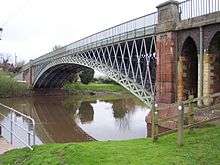 |
| Haw Bridge | 1961 | 51°56′56″N 2°13′36″W / 51.94899°N 2.22671°W | - | Near the village of Apperley | West of Tewkesbury. steel beam bridge. |  |
| X X |
 | |||||
known locally as the Maisemore Channel,[6] and the 3.6 mi (5.8 km) long East Channel around Alney Island[7] | ||||||
| X X | ||||||
| Maisemore Bridge | 1956 | 51°53′19″N 2°16′04″W / 51.88860°N 2.26772°W | - | Maisemore | Carries the A417. Single masonry arch, latest of several bridges here dating back to 1230. |  |
| New Over Bridge (Northern Bypass) | 1974 | 51°52′30″N 2°16′04″W / 51.87501°N 2.26790°W | - | Gloucester | A40 |  |
| Over Bridge | 1829 | 51°52′28″N 2°16′05″W / 51.87448°N 2.26797°W | Gloucester | Single masonry arch, built by Telford. |  | |
| Over Railway Bridge | 1957 | 51°52′26″N 2°16′05″W / 51.87378°N 2.26818°W | - | Gloucester | Railway bridge on the Gloucester to Newport Line. Originally the lowest railway crossing downstream as part of the South Wales Railway, until the construction of the Severn Tunnel. |  |
| Walham bridge (Northern Bypass) | 1983 | 51°52′30″N 2°16′01″W / 51.87502°N 2.26682°W | - | Gloucester | A40 | _geograph-4450039-by-David-Smith.jpg) |
| St Catherine's Viaduct | 51°52′30″N 2°16′01″W / 51.87502°N 2.26682°W | - | Gloucester | Railway bridge on the Gloucester to Newport Line. Originally the lowest railway crossing downstream as part of the South Wales Railway, until the construction of the Severn Tunnel. |  | |
| Westgate Bridge (eastbound) | 2000 | 51°52′12″N 2°15′24″W / 51.86997°N 2.25661°W | - | Gloucester | A417. It replaced an earlier bridges opened in 1189, 1809 and 1974. | _over_the_River_Severn_-_geograph_org_uk_-_435072.jpg) |
| Westgate Footbridge | 1974 | 51°52′11″N 2°15′24″W / 51.86977°N 2.25669°W | - | Gloucester |  | |
| Westgate Bridge (westbound) | 2000 | 51°52′10″N 2°15′25″W / 51.86957°N 2.25682°W | - | Gloucester | A417. It replaced an earlier bridge opened in 1974. |  |
| Castle Meads Footbridge | 1987 | 51°51′52″N 2°15′12″W / 51.86454°N 2.25329°W | - | Gloucester |  | |
| Castle Meads Bridge | 2005 | 51°51′45″N 2°15′27″W / 51.86262°N 2.25743°W | - | Gloucester | A430 |  |
| Llanthony Railway Bridge (disused) | 51°51′45″N 2°15′29″W / 51.86252°N 2.25816°W | - | Gloucester |  | ||
| Disused footbridge | 51°51′44″N 2°15′33″W / 51.86234°N 2.25906°W | - | Gloucester |  | ||
| Severn tunnel (1810) | 1810 | 51°47′16″N 2°26′46″W / 51.78770°N 2.44598°W | - | Newnham on Severn | Failed attempt to build a tunnel, abandoned after water broke in | |
| Severn Railway Bridge | 1876 | 51°43′56″N 2°28′28″W / 51.73234°N 2.47441°W | - | Lydney – Sharpness | Demolished 1970 after accident. |  |
| Severn-Wye Cable Tunnel | Circa 1970 | East 51°36′30″N 2°36′55″W / 51.6083446°N 2.6153657°W West 51°36′40″N 2°40′09″W / 51.61098°N 2.66921°W |
- | Beachley – Aust | The tunnel is 47.5 m deep, with a diameter of 3.05 m and a total length of 3,678 m.[8] The tunnel carries two 400 kV circuits, each with three cables.[9] The tunnel is owned by National Grid. The image to the right shows the cables on pylons entering the Aust (eastern) end of the tunnel before going underground. |  |
| Severn Bridge | 1966 | 51°36′33″N 2°38′18″W / 51.60903°N 2.63837°W | I | Chepstow – Aust | Steel suspension bridge. Listed as "Severn Bridge and Aust Viaduct, First Severn Crossing". | _full_view_-_geograph.org.uk_-_1742850.jpg) |
| Aust Ferry | 1827 | 51°35′56″N 2°37′59″W / 51.59888°N 2.63301°W | - | Beachley – Aust | Closed circa 1860. Service recommenced 1926, finally closed 1966. | 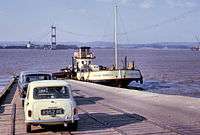 |
| Aust Severn Powerline Crossing | 51°36′21″N 2°38′29″W / 51.60578°N 2.64136°W | - | Longest powerline span in the UK at 1 mile (1,618 metres). |  | ||
| New Passage Ferry | 1863 | East 51°34′28″N 2°39′38″W / 51.574571°N 2.660611°W West 51°35′24″N 2°42′14″W / 51.589955°N 2.703867°W |
New Passage - Black Rock | Railway ferry link on the Bristol and South Wales Union Railway | .jpg) | |
| Severn Tunnel | 1886 | 51°34′30″N 2°41′20″W / 51.575°N 2.6889°W | - | Railway tunnel, part of the South Wales Main Line. |  | |
| Second Severn Crossing | 1996 | 51°34′24″N 2°41′50″W / 51.57331°N 2.69725°W | - | A cable-stayed bridge which marks the official start of the Severn Estuary. |  | |
See also
- Severn crossing
- List of crossings of the River Wye
- List of bridges in Wales
- List of disasters on the Severn
- Severn bore
- Severn Way
Bibliography
- Witts, Chris, A Century of Bridges, River Severn Publications, 2nd ed, 1998
Notes
- ↑ Listed Buildings, English Heritage, retrieved 22 April 2011
- ↑ "It's all systems go for July official opening as new cycle and footbridge gradually takes shape (From Worcester News)". Worcester News. Newsquest. Retrieved 28 June 2010.
- ↑ "New bridge over River Severn in Worcester opens". BBC Online. BBC. 20 July 2010. Retrieved 21 July 2010.
- ↑ http://archive.worcesternews.co.uk/2002/7/8/261801.html
- ↑ "Rhydd Ferry". H W Gwilliam. whepages. 1982. Retrieved 28 May 2011.
- ↑ "Over Bridge history and research". English Heritage. Retrieved 18 May 2011.
- 1 2 "River Severn at Gloucester: Flood Risk Management Study" (PDF). Environment Agency. Retrieved 18 May 2011.
- ↑ "Mono Severn Wye Tunnel Project wins award.". HighBeam. Retrieved 10 May 2011.
- ↑ "Severn-Wye Cable Tunnel refurb". Global Trade Media. Retrieved 10 May 2011.
External links
| Wikimedia Commons has media related to Bridges across the River Severn. |

